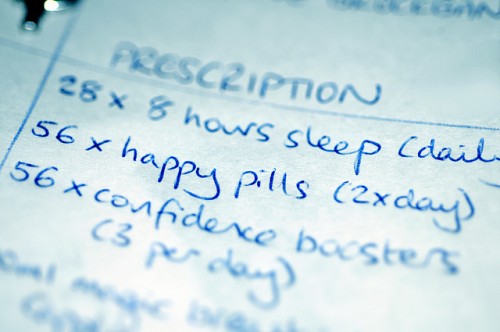 At the grocery store this morning I complimented the young woman who was packing my bags on her cheerful glittery headband and lanyard. That created a nice feeling between us, and I reflected, not for the first time, on how simple it can be to create good feelings with others and how much difference it can make in my experience of the day.
At the grocery store this morning I complimented the young woman who was packing my bags on her cheerful glittery headband and lanyard. That created a nice feeling between us, and I reflected, not for the first time, on how simple it can be to create good feelings with others and how much difference it can make in my experience of the day.
That got me to thinking about how easily the description of doing something cheerful can turn into a prescription and how the vibe of a prescription changes everything.
The vibe of a prescription says, Do this, and life will be better. You will be happier, more whole, more okay. Implicit in a prescription is the recognition of something to be improved, healed, or completed.
The vibe of a description is simply celebratory. How cool is this!
A prescription turns the experience of having a nice moment into something to be accomplished or achieved. Something we produce when we are doing life “right”.
A prescription implies that we are doing something wrong when the prescription doesn’t seem to work or when–heaven forfend!–we resist employing it.
It is so easy to infer from the celebration of one nice moment that one should do certain things to produce other nice moments.
Thus it is that we have some 450 forms of therapy, each with a prescription for managing the human experience to produce health. And then there are countless religious rites and practices, prescriptions developed over the years based on descriptions of what was going on when a given prophet or teacher experienced insight.
If you’ve employed some of these prescriptions, you know that sometimes they seem to work, and sometimes they don’t. Sometimes plopping your butt down on a meditation cushion produces peace, and sometimes all you get is a keen appreciation of the noisiness of your mind.
Sometimes complimenting the bagger feels great; sometimes the very idea makes you gritchy.
But what if life doesn’t want or need to be managed from dawn to dusk? What if we don’t need prescriptions for manipulating our moods and managing our experiences in order to be okay?
What if there is no aspect of the human experience that is disallowed?
To paraphrase Walt Whitman, We are large. We contain multitudes. Or in the words of the Roman slave turned playwright: I am a man, I consider nothing that is human alien to me.
The prescription to say kind things seems benign, but there’s a way in which it can actually insert distance between us. As anyone who has been approached in a bar can tell you, there’s a vast difference between the energy and impact of a spontaneous compliment and that of a canned come-on.
And I know for myself that when I’m feeling edgy, the idea that I should be nicer, friendlier, more easy going makes things worse, not better.
Oddly, our chances of making authentic connection with others are impaired when we make policies and prescriptions out of kindness and enhanced when we relax our vigilance and let our true colors shine through. A bit of unguarded crankiness can be the basis for connection, provided we aren’t preoccupied with covering it up.
I’m grateful for the good feeling I experienced in the grocery store over a compliment, but I’m even more grateful for the insight that I’m okay–as are you–whether I’m kind or cranky. That there’s no part of the human experience that we have to escape or avoid for any reason.
The bottom line is that it is all okay. Really all. All the time. And it doesn’t always feel that way, and that’s okay too.
Cheers,

Photo by Philippa Willitts via Flickr

